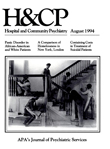Wilhelm Griesinger and the Concept of Community Care in 19th-Century Germany
Abstract
Wilhelm Griesinger, a 19th-century German physician, can be considered one of the founders of the concept of community-based care for mentally ill patients. In an era when such patients typically spent most of their lives in asylums in remote rural areas, he recommended their integration into society and proposed that short-term treatment of acutely ill patients could be carried out in asylums that were located in cities and linked to general hospitals. He believed that short-term hospitalization could be effective only if proffessional and natural support systems cooperated closely. Although be did not assume that all mental illnesses could be cured, be thought that most patients should be discharged from long-term treatment in remote asylums. For those unable to live without support in the community, he suggested setting up sheltered living conditions. Although his ideas about communitybased care were rejected by his contemporaries in favor of a system of rural asylums, many of Dr. Griesinger's suggestions are now being put into practice.
Access content
To read the fulltext, please use one of the options below to sign in or purchase access.- Personal login
- Institutional Login
- Sign in via OpenAthens
- Register for access
-
Please login/register if you wish to pair your device and check access availability.
Not a subscriber?
PsychiatryOnline subscription options offer access to the DSM-5 library, books, journals, CME, and patient resources. This all-in-one virtual library provides psychiatrists and mental health professionals with key resources for diagnosis, treatment, research, and professional development.
Need more help? PsychiatryOnline Customer Service may be reached by emailing [email protected] or by calling 800-368-5777 (in the U.S.) or 703-907-7322 (outside the U.S.).



